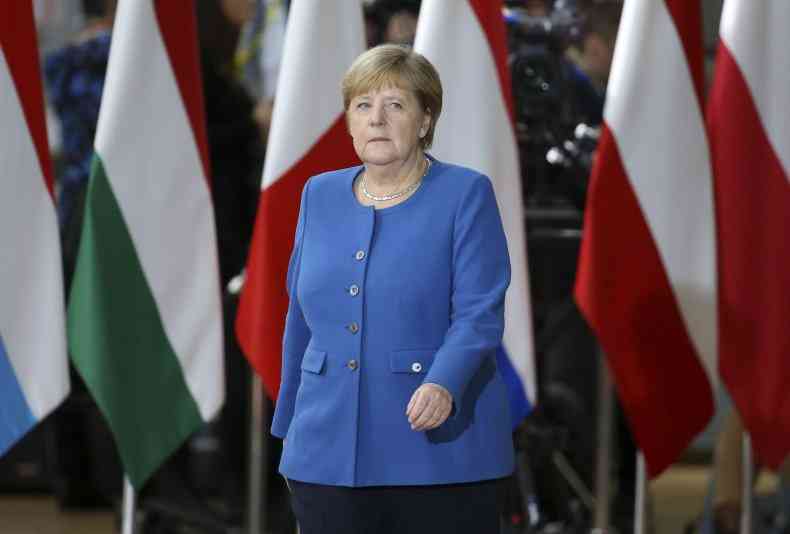German authorities are considering banning telecom carriers from using certain components from Huawei and ZTE in their 5G networks, Reuters reports. The move could make it more difficult for the Chinese tech giant to keep a foothold in Europe’s biggest telecoms market, according to government sources.
The decision comes after Germany passed an IT security law in 2021 that imposes high hurdles on makers of telecommunications equipment for next-generation networks, but stopped short of banning Huawei and ZTE, as some other countries have done.
1. Germany’s Chancellor Angela Merkel
Angela Merkel, Germany’s Chancellor and leader of the Christian Democratic Union (CDU), has become increasingly reluctant to openly antagonize China for fear of triggering retaliation from Beijing. She has sought to bolster economic ties with China and ease bilateral trade tensions, while also re-focusing German foreign policy on the European Union.
In recent years, Merkel’s approach has shifted towards an emphasis on European sovereignty – for instance by supporting new joint Franco-German industrial projects aimed at boosting Europe’s technological competitiveness. She has also been more willing to sign onto elements of French President Emmanuel Macron’s European sovereignty agenda, including his push for an EU-wide industrial champion and reforms to EU competition policy.
Her stance has been criticized by some, especially in her own party and by the Social Democrats, which have taken a harder line on Huawei. But her popularity remains largely intact, even after she announced she won’t seek a fifth term in office when her current one expires in 2021.
2. Germany’s Economy Minister Robert Habeck
Germany has a new Economy Minister, Robert Habeck, who is known for boosting public support for renewable energy. The minister will be responsible for tackling the country’s climate crisis and is expected to make a bold push for cutting carbon emissions.
Habeck’s plans come at a time when Germany is struggling to avoid a recession due to shortages of natural gas from Russia and high energy prices. He has also been forced to seek emergency sales of coal-fired power plants and extend the lifespans of nuclear power plants.
Rather than heeding US calls for an outright ban, Berlin is likely to follow the lead of France and Britain in restricting cooperation with Huawei and ZTE. But doing so could prove challenging given the size of the Chinese market and the close ties that Germany has to its largest trading partner.
3. Germany’s Industry Minister Peter Altmaier
In a move that may have significant security implications, Germany plans to ban telecom operators from using certain controlling elements from China’s Huawei and ZTE in 5G networks. That could include components already built into networks, requiring operators to remove and replace them, according to a report by Zeit Online on Monday.
The decision comes as Europe prepares to deploy 5G, a technology that would allow faster and more reliable mobile broadband. However, some European governments are reconsidering their strategy based on national security concerns.
Those concerns include the possibility that equipment from untrusted countries could compromise intelligence sharing between countries, a risk that Washington is particularly concerned about as it works to strengthen ties with its European allies.
It’s a complicated question for Berlin, which wants a rapid roll-out of 5G to keep its ailing mobile network in shape. Yet a group of lawmakers wants to ban equipment from China’s Huawei Technologies Co. It’s a tough choice for the country, which relies on the Chinese company’s gear to power its telecommunications infrastructure.
4. Germany’s Parliament
In the last couple of months, Germany’s Parliament, known as the Bundestag, has become increasingly involved in the debate about whether to ban China’s Huawei. Chancellor Angela Merkel is coming under pressure from her own party to do so, as well.
But Germany is not a country that has traditionally been very concerned about how its technology companies are treated by other countries. Despite Merkel’s talk of ensuring “European technological sovereignty,” her policies have typically been more concerned about limiting Chinese espionage than protecting the interests of German companies.
But that changed earlier this year when Foreign Minister Heiko Maas convinced Interior Minister Horst Seehofer to join the anti-Huawei camp. This led to a wider political discussion about 5G security. In the end, Maas pushed for an evaluation of the trustworthiness of all companies that would be involved in building Germany’s 5G networks. He argued that a company must be able to guarantee it will not pass information and data to China’s government before it can participate in the project.
